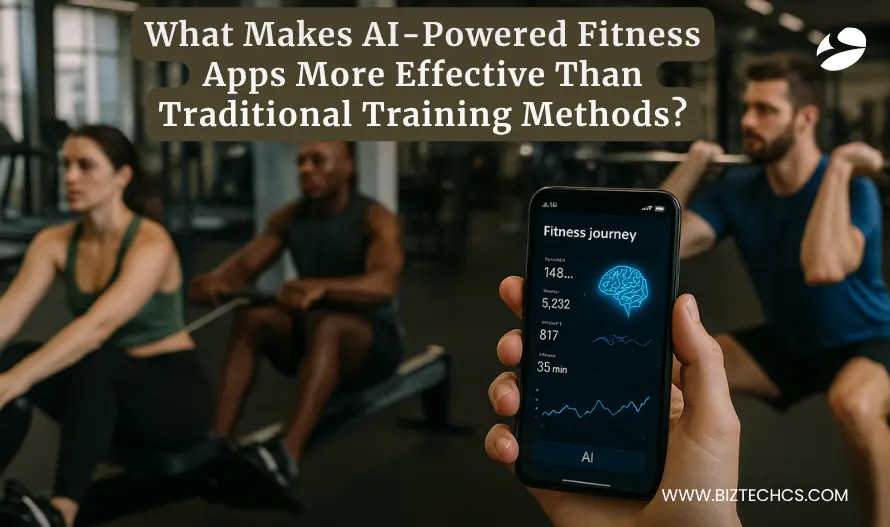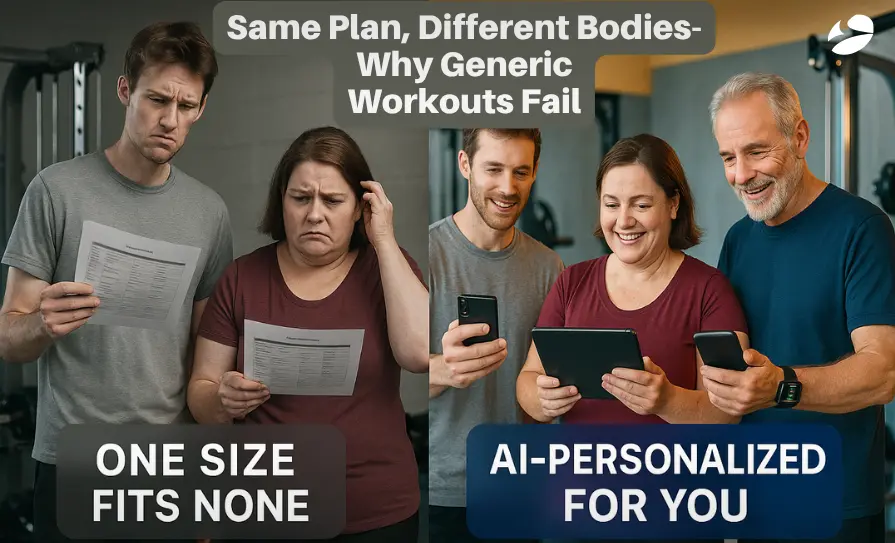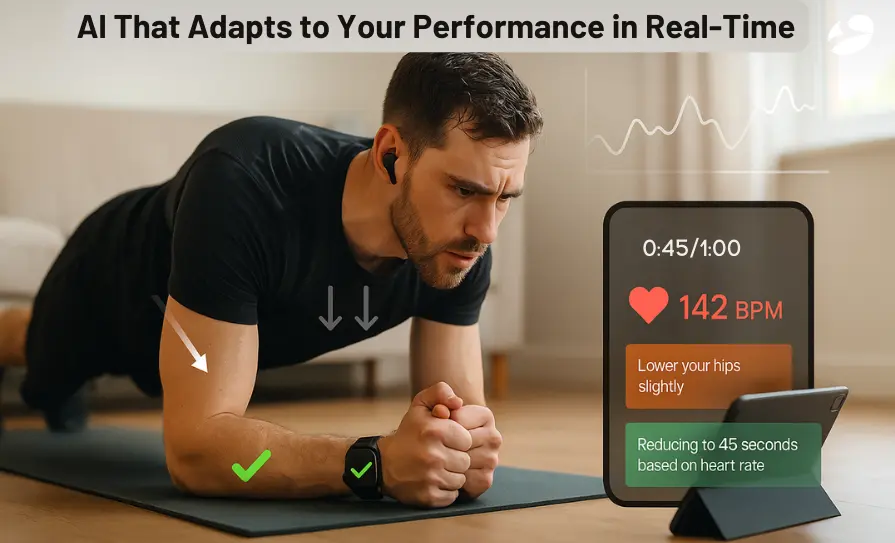What Makes AI-Powered Fitness Apps More Effective Than Traditional Training Methods?
5 min read
5 min read

Your smartphone knows your coffee order, your shopping habits, and probably your deepest fears, yet most fitness programs still treat you like a factory-produced mannequin with identical muscles. The irony burns more than leg day.
Those cookie-cutter workout plans have killed more fitness dreams than expired protein powder and January 2nd hangovers combined. About 63% of people who sign up for a gym membership fail to use it, and nearly half of new members drop out within six months, highlighting how generic, one-size-fits-all programs fail to keep people engaged (Smart Health Clubs, 2025).
The fitness industry has been serving everyone the same reheated leftovers and wondering why nobody’s coming back for seconds. Enter AI workout recommendations that actually know the difference between your body and your neighbor’s, creating personalized fitness experiences that adapt faster than you can say “burpee.”
AI in fitness apps has gone from science fiction to the sweaty reality of millions who’ve discovered that technology, developed by leading AI Development Company, can be a better trainer than that guy who keeps telling you to “feel the burn” while checking his Instagram.
This deep dive explores how AI-powered workout scheduling and intelligent platforms are turning fitness failures into success stories, one customized rep at a time.
Traditional fitness programs are like using a flip phone in the age of quantum computing—technically functional but practically useless.
Generic workout plans assume everyone’s body operates like a standardized widget. No surprise, then, that the average gym loses about 40% of new members within the first year, with the highest dropout rate occurring in the first three months (Benfit, 2025).

Modern fitness apps bombard users with 10,000 different squat variations while offering zero guidance on which one won’t destroy their particular set of knees. Progress tracking consists of scribbling numbers on a sweaty notepad that gets lost faster than motivation on a Monday morning.
Between juggling work deadlines and life’s general chaos, finding time to exercise becomes another task on the never-ending to-do list that keeps growing like a mutant spreadsheet.
The real kick in the teeth is that these one-size-fits-all approaches ignore individual body types, fitness levels, and goals. They prescribe the same solution whether you’re training for a triathlon or just trying to climb stairs without sounding like Darth Vader.
Without AI workout recommendations that adapt to real human complexity, traditional fitness solutions will keep producing the same result: expensive memberships funding empty gyms while people search for something that actually works.
Here’s what business leaders are really asking: “What’s the actual ROI of switching from traditional to AI-powered fitness platforms?” The numbers speak louder than a spin instructor’s playlist—companies implementing ai application development services report 47% higher user retention rates and 3.2x improvement in customer lifetime value within the first year.
When your users stick around long enough to see results, they become walking billboards rather than cautionary tales.
AI-driven platforms don’t just track your workouts—they evolve with you, transforming generic routines into dynamic, personalized fitness experiences.
AI in fitness apps processes your workout data faster than you process the regret of that third slice of pizza. While traditional programs make you wait weeks to adjust your routine, AI platforms analyze every rep, every heart rate spike, and every pathetic attempt at a pull-up in real-time.
The system adapts your next workout based on actual performance, not some prehistoric chart created when people thought carbs were the enemy. This is where expertise matters. BiztechCS builds custom AI models that adapt to each user’s progress and preferences in real time. Your fitness platform responds faster than users can come up with excuses to skip workouts.
Machine learning algorithms study your exercise patterns like a stalker with a PhD in data science. They notice you skip leg day every Tuesday, slow down after lunch workouts, and mysteriously get stronger when certain songs play.
These systems identify trends humans would miss, like how your Monday energy levels correlate with weekend alcohol consumption (spoiler: inversely).
BiztechCS can implement advanced ML algorithms that analyze user behavior patterns and fitness metrics. These insights power truly personalized workout experiences—turning raw data points into tailored recommendations that keep users engaged and coming back for more.
Your smartwatch finally gets to do something more useful than reminding you to stand up every hour like an electronic nanny. AI platforms sync with wearables to collect heart rate variability, sleep quality, stress levels, and that shameful step count from yesterday.
This data feast helps AI-powered workout scheduling adjust your training based on recovery status, not just blind hope. The integration creates a feedback loop tighter than your pants after the holiday season.
The moment you give a workout a mark or skip an exercise, the AI notes it, like a passive-aggressive personal assistant. The system gradually learns about your likes and dislikes, realizing that ‘moderate intensity’ can mean different things to different people (for some, it could mean walking to the fridge).
However, unlike a human trainer, who is likely to forget that you have a bad knee or that you do not want to do burpees, the AI Development Company always remembers and accordingly modifies future workouts.
This nonstop tuning means the platform is getting smarter while you are getting fit, forming a perfect union of silicon and sweat.
Wondering how your fitness platform could transform from a static app into an intelligent system that evolves with every user interaction? The technology exists—you just need the right partner to implement it.
AI renders personalized fitness experiences to millions at once, just like a personal trainer who is a kind of magician, able to be everywhere at once. In contrast, traditional methods consider personalization a luxury and offer it only to those who can afford three-digit hourly rates.
AI platforms take into account each user’s biomechanics, preferences, and goals to devise personalized programs that can confuse even identical twins during workouts.
This level of customization makes personal fitness as accessible as bad gym selfies. It removes the exclusivity that once limited personalized training to professional athletes and people with disposable income.
Yet executives often wonder: “How complex is it to implement these ai application development services compared to our current setup?” Surprisingly, modern AI platforms integrate faster than your members lose motivation in January.
Cloud-based solutions can be deployed in 4-6 weeks, compared to the months required for traditional software overhauls. The real complexity isn’t in implementation—it’s in explaining to shareholders why you waited so long to make the switch.
AI transforms your fitness routine from a one-size-fits-all plan into a dynamic, evolving journey tailored to your habits, goals, and quirks.
AI scrutinizes your workout history like a detective trying to uncover the reason for your ongoing avoidance of yoga, even though you admit you need to work on your flexibility. The system looks at past performance, drills down into your exercise preferences, and recalls that dare-you moment when you fell off the treadmill to propose classes that suit your real capabilities, not your inflated self-assessment.
AI Development Company workout recommendations factor in your fitness goals, whether that’s running a marathon or just tying your shoes without grunting. BiztechCS can build recommendation engines that factor in fitness level, available equipment, time constraints, and personal preferences.
Think of it as a matchmaking service between you and exercises that won’t make you fake an injury.
AI-powered workout scheduling understands your calendar better than your assistant, who keeps scheduling meetings during lunch.
The system identifies patterns in your energy levels, noticing you’re basically a zombie before 10 AM but turn into a fitness beast after your third coffee. It schedules workouts when you’re most likely to actually show up, instead of sending another “running late” text to no one.
The AI syncs with your work calendar, automatically moving sessions around conference calls and deadlines, because missing a workout due to poor planning hurts more than the workout itself.

The AI Development Company watches your form like a judgmental parent at a school play, offering instant corrections before you herniate something important. It tracks every metric from heart rate to rep speed, adjusting intensity when it notices you’re either sandbagging or about to pass out.
The system provides feedback faster than your brain can come up with excuses, suggesting modifications as your form degrades from “textbook” to “what the hell was that?”
Progress visualization shows your journey from couch potato to slightly less potato-shaped human, celebrating small wins because sometimes just showing up deserves recognition.
Smart business owners inevitably ask: “What about data privacy and security when collecting all this personal fitness information?” AI platforms worth their salt employ bank-level encryption and comply with HIPAA standards, treating user data like nuclear launch codes rather than Facebook status updates.
The liability of a data breach far outweighs any savings from choosing cheaper, less secure options—your legal team will thank you for not turning their jobs into a litigation nightmare.
AI in fitness apps can identify plateaus more quickly than you can spot free pizza in the break room. When progress stalls, the system changes strategies, just like a chess grandmaster who plays as a personal trainer in his off-hours, waking the challenges before boredom kills motivation.
It suggests rest days based on real fatigue indicators, not on your habit of saying you are tired after going to the parking lot. The platform manages progressive overload with the precision of a Swiss watch, planning your long-term fitness journey while you can barely plan what’s for dinner tonight.
Ready to give your users a fitness experience that actually adapts to their lives instead of forcing them into rigid programs? Your competitors are already making the switch.
From individual users to large organizations, AI-powered fitness solutions create value across the entire fitness ecosystem by enhancing efficiency, personalization, and scalability.
Personal trainers can finally manage more than five clients without having a mental breakdown or mixing up everyone’s workout plans like a dealer shuffling cards at a casino.
AI handles the grunt work of program design, letting trainers focus on what they do best: counting reps and yelling motivational clichés that somehow still work.
BiztechCS can create custom dashboards for trainers to monitor all clients simultaneously, turning them into fitness orchestrators conducting a symphony of squats across multiple time zones. Progress tracking becomes automatic, eliminating the ancient ritual of flipping through crumpled notebooks trying to remember if Steve could bench 135 or 155 last week.
Without AI, fitness app startups find themselves as if they’d brought a butter knife to a gunfight where everyone else had rocket launchers.
Ai application development services is the primary factor that decouples successful fitness apps from the digital graveyard of abandoned downloads, which lie gathering dust in app stores. When a platform actually acknowledges users as individuals and adjusts its features accordingly, retention goes up. Traditional apps do the opposite—treating everyone like a fitness-robot clone.
Personalization at scale means catering to millions without hiring an army of trainers. It also helps companies turn a profit before the venture capital dries up and the founders are forced to survive on instant noodles.
Here’s what stakeholders really want to know: “Can these AI systems actually scale without degrading performance or user experience?” The beauty of properly architected AI platforms is they get smarter with more users, not dumber. Unlike human trainers who max out at handling 30 clients before quality suffers, AI systems handle 30,000 with the same precision.
Each new user adds to the collective intelligence, making recommendations better for everyone—it’s like crowd-sourcing fitness wisdom without the terrible advice from gym bros.
Corporate wellness programs finally get to prove they’re more than expensive virtue signaling that looks good in annual reports but achieves nothing. AI workout recommendations track employee health metrics across entire organizations, identifying trends like how the accounting department’s fitness levels mysteriously tank during tax season.
BiztechCS can build enterprise-grade wellness platforms with advanced analytics and reporting, turning vague wellness initiatives into data-driven programs with measurable ROI that finance departments actually respect.
Group challenges maintain individual tracking, so competitive colleagues can battle for fitness supremacy while HR monitors participation rates and prays nobody gets injured trying to win a gift card.
CFOs cutting straight to the chase ask: “What’s the cost comparison between AI-powered platforms and traditional corporate wellness programs?” Initial investment in AI platforms typically runs 30-40% higher, but operational costs drop by 60% after year one since you’re not paying armies of wellness coordinators to manage spreadsheets.
The break-even point hits around month 14, after which you’re essentially printing money while employees actually get healthier—a win-win that makes board presentations practically write themselves.
The future of AI in fitness apps looks like a sci-fi fever dream: your VR headset transports you to virtual gyms, while AR overlays show perfect-form demonstrations, making actual mirrors obsolete along with your remaining excuses.
Advanced biometric monitoring will predict health issues before they happen, alerting you about that heart attack brewing three years out if you keep treating vegetables like decorative garnish.
AI personal training avatars will become so sophisticated they’ll guilt-trip you better than your mother, while seamlessly integrating with healthcare systems to tattletale directly to your doctor about those “occasional” cheat meals that happen daily.
Predictive analytics will know you’re about to quit your fitness routine before you do. It will step in with preventive health recommendations that feel less like suggestions and more like interventions from concerned algorithms.
The line between fitness coach and medical advisor will blur faster than your vision during a max-effort sprint. As that shift happens, skipping workouts could become as socially unacceptable as replying all to company emails.
AI Development Company has transformed fitness from a game of chance where success rates rival lottery odds into a science where personalization actually means something beyond marketing fluff. Businesses still clinging to traditional fitness solutions are essentially selling typewriters in the age of quantum computing, watching their user base abandon ship faster than rats fleeing a sinking yacht.
The smart money moves now, implementing AI workout recommendations before competitors figure out why their retention rates look like a stock market crash. Early adopters ride the wave. Laggards drown in their own obsolescence. Waiting for perfect timing in tech adoption is like waiting for every traffic light to turn green before leaving your driveway.
The choice is simple: build AI-powered fitness platforms that actually work, or keep funding empty gyms that serve as monuments to human procrastination and broken New Year’s resolutions.
The fitness industry is evolving faster than a HIIT workout, and businesses still using yesterday’s technology are getting left behind. Ready to build an AI-powered fitness platform that turns users into success stories instead of statistics?

Odoo
50
By Uttam Jain

Odoo
42
By Uttam Jain

Artificial Intelligence (AI)
99
By Nandeep Barochiya